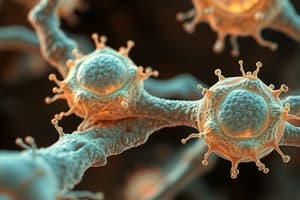Podcast
Questions and Answers
What type of cell junction forms a barrier to prevent the passage of materials between cells?
What type of cell junction forms a barrier to prevent the passage of materials between cells?
- Desmosome
- Gap junction
- Tight junction (correct)
- Anchoring junction
Which type of junction is primarily involved in providing mechanical support to tissues?
Which type of junction is primarily involved in providing mechanical support to tissues?
- Tight junction
- Synapse
- Anchoring junction (correct)
- Gap junction
Which cell junction type allows for direct communication between adjacent cells?
Which cell junction type allows for direct communication between adjacent cells?
- Anchoring junction
- Tight junction
- Transitional junction
- Gap junction (correct)
Which junction helps maintain tissue integrity under mechanical stress?
Which junction helps maintain tissue integrity under mechanical stress?
What distinguishes tight junctions from anchoring junctions?
What distinguishes tight junctions from anchoring junctions?
Flashcards
Tight junction
Tight junction
A type of cell junction that forms a barrier between cells, preventing the passage of molecules.
Anchoring junction
Anchoring junction
A type of cell junction that anchors cells together or to the extracellular matrix.
Gap junction
Gap junction
A type of cell junction that allows the passage of small molecules and ions between adjacent cells.
Study Notes
Cell Junctions
- Tight junctions: Prevent leakage between cells
- Adhesion belt: Strengthens the tight junction
- Desmosome: Provides structural support and stability
- Gap junction: Allows direct communication between cells
- Focal adhesion: Anchors cell to extracellular matrix
- Hemi-desmosome: Anchors cell to basal lamina
- Integrin: Protein involved in cell adhesion
- Selectin: Protein involved in cell adhesion
- CAM: Cell adhesion molecule
- Membrane proteoglycan: Protein that interacts with extracellular matrix
Studying That Suits You
Use AI to generate personalized quizzes and flashcards to suit your learning preferences.



